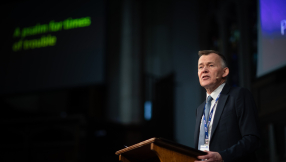A furious row has broken out within the Catholic Church over the Belgian Brothers of Charity, who are refusing to comply with a Vatican order to stop providing euthanasia for the people it cares for.
The UK-based Catholic priest Alexander Lucie-Smith has described the behaviour of the Brothers as 'utterly outrageous,' and pointed out the crucial fact that the order is lay-run.
In a statement released in Flemish, French and English, the organisation said it 'continues to stand by its vision statement on euthanasia for mental suffering in a non-terminal situation' and goes on to make the incendiary claim that it 'is still consistent with the doctrine of the Catholic Church. We emphatically believe so.'
'This claim is utterly outrageous,' wrote Lucie-Smith in a blog for the Catholic Herald. 'The Catholic Church teaches and has always taught that one cannot secure a perceived good through doing an intrinsically evil act. The killing of an innocent human being is an intrinsically evil act. It can never be justified.
'Equally outrageous is the claim that the Brothers of Charity know more about moral theology than does the Vatican. Let us remember that here the Vatican is not just a bunch of people in Rome, but the mouthpiece for the bi-millennial Christian tradition. The Brothers are not just disagreeing with the Vatican and telling them that they know better: they are saying the same to St Augustine, St Thomas Aquinas and every Catholic theologian of the past you have ever heard of.'
The 'Broeders van Liefde' board had been given until the end of August to comply with the Vatican order, which was seen and approved by Pope Francis, according to the Catholic News Agency (CNA).
The Catechism of the Catholic Church, in paragraph 2277, states that: 'Whatever its motives and means, direct euthanasia consists in putting an end to the lives of handicapped, sick, or dying persons. It is morally unacceptable.'
The group runs 15 psychiatric hospitals with 5,000 patients, and the board controlling these institutions announced in the spring that they would permit euthanasia in their facilities.
The board argued in its statement that its position 'always takes into account the shifts and evolutions within society', while also considering 'recognition of the exceptional, proportional view of ethics, deontological view and ideologization, and choice of conscience'.
This view is not shared by the general superior of the order, Brother Rene Stockman, who approached the Vatican for help when the board announced that it would start permitting euthanasia.
Indeed, the key to explaining why this row has broken out may lie in its apparently more secular leadership.
The order's website states: 'Altogether, there are 30,000 people who receive care or education through the Brothers of Charity, who have 12,000 employees and staff members in Belgium.'
Lucie-Smith points out that the 'Belgian operation is presumably under the nominal authority of the religious order, but the lay people who run it...are refusing to take their orders from the religious Brothers.'
He continues: 'So the story here, and it is important to stress this, is not a religious order administering euthanasia, which would be shocking, but the only marginally less shocking phenomenon of a Catholic-in-name organisation, founded by a religious order, doing so. What we see here is what sometimes happens in other types of institutions: a Catholic foundation, placed under lay control, gradually losing its Catholic ethos.'
The priest goes on to express his hope 'that the Vatican will act swiftly to break the link between the order and the organisation that uses its name and that it will forbid the organisation to use the word Catholic in any of its literature.
'However, none of that will be easy. There is also the chance that the Church authorities will try to sack the lay leadership of the organisation, and re-Catholicise it, by imposing a new management team.
'Whatever happens, it is going to be messy, and lawyers, both canon lawyers and civil ones, are bound to get involved. It will be a protracted business, sadly. But it has to be confronted. There is too much at stake. Mr van Rompuy and his associates have thrown down the gauntlet to Rome; Rome will have to respond further.'
Other Catholics agree it will indeed be 'messy'.
Professor Kurt Martens, a Belgian Catholic who teaches canon law at the Catholic University of America, told CNA last month that 'the Brothers who are members of the board face dismissal from their institute – thus will no longer be brothers and members of the institute – and the health care institutions would forfeit their right to call themselves Catholic'.
Time will tell how the Vatican responds. But the longer it takes to act, the more toxic this row will surely become.













